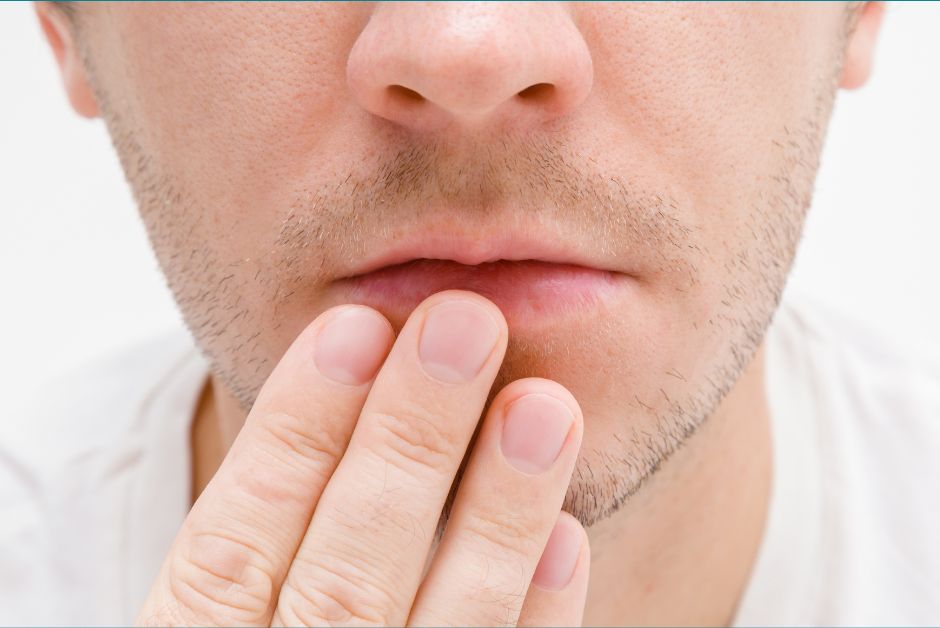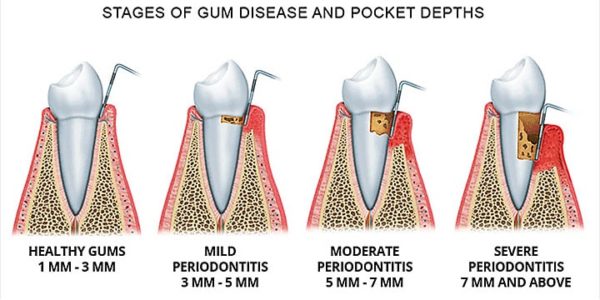

Periodontitis, also known as gum disease, is a severe gum inflammation that damages the soft tissue in the mouth. If left untreated, the condition, which is most common in adults, can lead to the erosion of bone resulting in tooth loss.
Gum inflammation is caused by the build-up of bacteria in dental plaque, an almost invisible layer of saliva proteins and bacteria that settles on your teeth. When left untreated, this soft layer can turn into a hard layer known as tartar. The harmful bacteria found in tartar will cause inflammation in the gum called gingivitis.
This inflammation causes pockets to develop between the gum and teeth. A second layer of dental plaque will then form on top of the hardened tartar enabling the inflammation to spread deeper, eroding the layers of bone around the jaw.
As the inflammation spreads deeper into the jawbone, periodontitis occurs causing bone decay that can result in the loss of teeth or dental implants.
It is worth noting that healthy gums are firm, pale pink and fit snuggly around the teeth.

The effects of periodontitis can majorly impact your oral health, as well as your overall health and general appearance.
As the disease causes the gum line to recede, this can cause extreme discomfort. The roots of your teeth are partially exposed, resulting in sensitive teeth and gums. This can be very painful when brushing your teeth, eating and drinking – especially with hot and cold food and drinks.
Ultimately, periodontitis will cause your teeth or dental implants to loosen, impacting greatly on your ability to chew. This can also lead to gaps in between your teeth and bad breath.
Periodontitis can also have a major impact on your general health, with close links to diabetes and cardiovascular disease.
With its oxygen-enriched formula, blue®m can help prevent periodontitis. Here are our recommended products.
When your gums bleed, it could mean you have gum inflammation caused by dental plaque.
In order to take care of your teeth and gums, it is recommended that you maintain a good oral health routine. This includes brushing your teeth properly at least twice a day for two minutes. Once complete, rinse with mouthwash and use floss or interdental brushes to clean between your teeth.
Furthermore, make sure to visit an oral hygienist or dentist at least twice a year.
For more information on improving your oral health, check out our handy seven-step guide.
Maintaining good oral health relieves the symptoms and helps prevents tooth loss. However, there are treatments for periodontitis that cannot be carried out at home.
In order for the gums to heal, all coatings of plaque and tartar must be removed from your teeth. This is usually carried out by a dental professional who will thoroughly clean your teeth, preventing the build-up of bacteria in any pockets that have formed.
You may be required to attend follow-up visits to check on your oral health and ensure the disease has not returned.
In extreme cases of periodontitis, the deeper pockets that have formed in the gum may require surgical treatment.
With uniquely blended ingredients designed to promote good oral health, blue®m products are specifically designed to combat the ill effects of periodontitis.
If you are suffering from the disease, highly respected oral surgeon, Dr Peter Blijdorp, recommends using blue®m products to improve the condition.
For the best results, brush your teeth for two minutes twice daily using blue®m Toothpaste and rinse thoroughly with blue®m Mouthwash.
Apply blue®m Oral Gel to your gumline after brushing and allow the oxygen-enriched formula to control the harmful bacteria in your mouth and prevent inflammation.
If your gum pockets are deeper than 4 mm, Dr Blijdorp advises you to rub blue®m Oral Gel in the pocket. This way the oxygen can have an optimal effect in the mouth. By regularly using a combination of blue®m’s Oral Gel, Toothpaste and Mouthwash, the pocket will reduce in size and, in most cases, the inflammation will disappear.
View our complete blue®m product range here.
Remember; healthy mouth, healthy body.
We have numerous amounts of bacteria in our mouth. These bacteria can stick to your teeth – this is called plaque. Plaque, if not removed properly, can cause an infection. If you don’t treat the infection, you teeth can eventually become loose and even fall out. Risk factors include: smoking, stress, bad dental hygiene and diabetes.
Periodontitis can cause gums to look red and swollen, and can cause bleeding. It can also cause bad breath. As periodontitis is not always visible, it is important to have a regular check-up with your dentist.
Periodontitis is associated with a higher risk of heart problems, problems during pregnancy, and increased risk of infections. Periodontitis can also cause halitosis (bad breath).


All orders are handled and dispatched by Swallow Dental Supplies Ltd.
